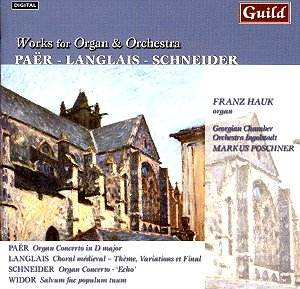Unlike
other instalments in Guild’s ongoing series of recordings of works
for organ and orchestra which I reviewed some time ago, this new
release is somewhat different in that the works recorded here
belong to quite different musical periods. The disc opens with
Paër’s Concerto in D major composed about 1794-1795,
probably for the inauguration of a new organ at the Oratorio della
SS. Trinita in Parma, which is cast in a completely traditional
mould and in a classical idiom. It is nonetheless a substantial
and attractive work of some nobility. The closing item is the
Prelude from Bach’s cantata Wir danken dir, Gott BWV 29
which ends this programme in an appropriately bright, festive
mood.
More
recent pieces (i.e. from the 20th Century) are included,
which makes this disc the more desirable. The earliest of these
is Widor’s Salvum fac populum tuum for organ, three
trumpets, three trombones and side drum. This was composed in
1916, possibly in anticipation of the end of World War I. For
obvious reasons, Widor conducted the first performance six days
after the end of the war in Notre-Dame on November 17th,
1918. The title is borrowed from the Te Deum, but the piece
– to the best of my knowledge – does not quote any plainsong tune.
It takes the form of a solemn processional with strong march rhythms
and broad tunes, thankfully full of restraint and free from any
jingoism. A dignified, deeply felt work for all its brevity.
Langlais,
whose splendid Third Concerto featured in Guild GMCD 7240 which
I reviewed
here some time ago, is represented by two hitherto unpublished
works. His short Choral médiéval for
organ, three trumpets and three trombones (we are not told when
this was composed) is based on the Kyrie of the third choral mass
Deus sempiterne and ends with a brief statement of Victimae
paschali laudes. His Thème, Variations et Final,
completed in 1937, is an altogether more substantial work. It
is scored for strings, three trumpets and three trombones, and
is roughly cast as a grand passacaglia opening with the
sombre, brooding theme in the basses. The contrasted variations
follow in quick succession and are capped by the concluding fugue
enlivened by the brilliance of the brass contributions. The insert
notes, excellent as usual, do not make it clear, but it seems
that Langlais reworked the piece in 1961 to make it his Second
Organ Concerto (organ and strings, without any brass). Maybe some
reader might prove me wrong... or right? Anyway, this is a worthwhile
addition to Langlais’s discography and one that his admirers will
want to have.
The
most recent work here is Enjott Schneider’s Echo – Concerto
for Organ and Strings which was first performed in 2002
and probably completed about that time. The composer describes
his work as an "unproblematic organ concerto" roughly
inspired by the myth of the mountain nymph Echo and her unrequited
love for Narcissus. Echo is in three movements,
a long slow movement ("Echo and Narcissus") framed by
a lilting Dance and a lively Finale. The music is clear-cut, direct
and accessible in a Neo-classical manner, though the organ part
may not be as easy as expected, particularly so in the outer movements.
It sometimes brought to mind the happy music making displayed
in Hans-André Stamm’s Organ Concerto, another
accessible and enjoyable candidate for Guild’s series of organ
concertos.
The
present release is yet another fine instalment in this Guild series
which will hopefully go on exploring this unfamiliar but often
quite rewarding repertoire. Hauk’s readings, more than ably supported
by the orchestra and Guild’s overall production, are superb throughout.
Again, the recording team successfully mastered the reverberating
acoustics of Ingolstadt’s Liebfrauenmünster. More of this,
please. Warmly recommended.
Hubert
Culot
